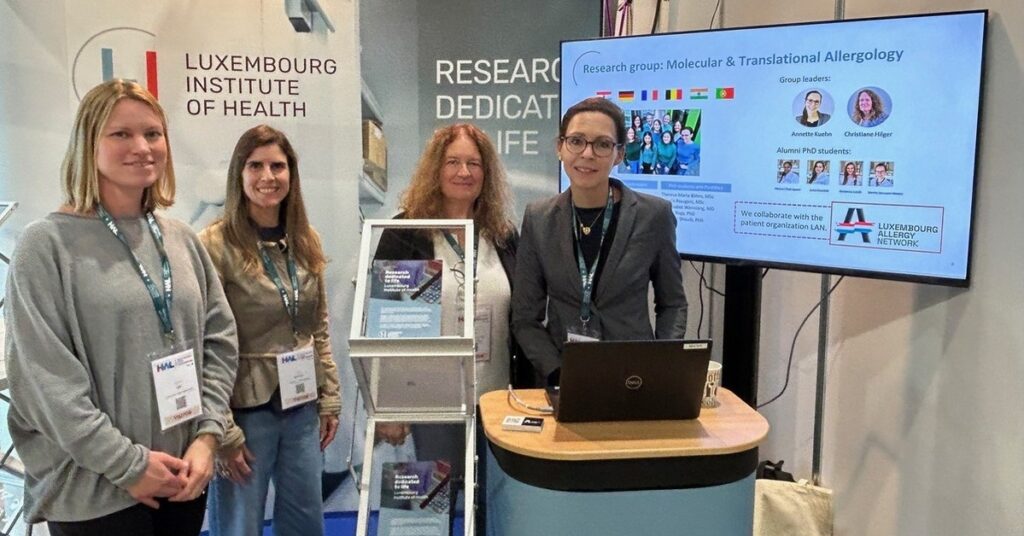News
International recognition for Luxembourg allergy research
LIH allergology researchers duly rewarded in Amsterdam and Paris

ISMA 2019 (From left to right: Mounir Chentouh, Bente Janssen-Weets, Dr Christiane Hilger, Neera Chakrapani, Kyra Swiontek)
A team of researchers from the Molecular and Translational Allergology group at the LIH’s Department of Infection and Immunity were recently awarded a series of prizes in recognition of their high-impact research during the 8th International Symposium on Molecular Allergology (ISMA) in Amsterdam and at the Allergy School on Food Allergy in Paris.
Advancing allergen characterisation
The ISMA is a meeting organised every two years by the European Academy of Allergy and Clinical Immunology (EAACI). The 2019 edition, which took place from 28th to 30th November in Amsterdam, brought together about 300 international allergology experts to discuss the newest developments in the field of molecular allergology and their impact on allergy diagnosis and therapy. The event proved to be a very successful opportunity for the LIH Molecular and Translational Allergology group to showcase its work and obtain recognition for its contribution to allergology research.
Indeed, Group Leader Dr. Christiane Hilger, who is also a board member of the WHO/IUIS Allergen Nomenclature Sub-Committee, gave a presentation on allergen nomenclature and the criteria for assigning new allergen names, while team members Bente Janssen-Weets, Neera Chakrapani, Kyra Swiontek and Mounir Chentouh — visiting scientist at LIH on an EAACI Fellowship Research Grant — presented four posters on their research projects. In particular, PhD student Bente Janssen-Weets and Research Engineer Kyra Swiontek both won prizes for their excellent poster presentations, while PhD candidate Neera Chakrapani was awarded an EAACI travel grant to support her attendance at the symposium, in recognition of her work on the characterisation of glycolipids in meat-allergic patients.
Bente’s poster, titled “The major guinea pig allergen Cav p 1 is a lipocalin that strongly binds short chain fatty alcohols”, was selected as the best within the thematic poster session “Allergen Molecules”. She presented her research on the isolation and characterisation of two major isoallergens from guinea pigs, funded by an FNR PRIDE grant. With her poster “Anaphylaxis after sensitization to snake venom by repeated skin exposure – A case report”, Kyra won the prize for best poster presentation within the “Clinical Cases” thematic session. She presented the case of a severe allergic reaction to snake venom by repeated skin exposure and in the absence of bites, in response to a specific allergen identified at LIH.New insights into food allergies
These prizes were followed by another series of rewards bestowed upon the Molecular and Translational Allergology group just a few days later, on the occasion of the Allergy School on Food Allergy held by EAACI. The course, which took place in Paris from 5th to 7th December, aims to train participants on the epidemiology, pathophysiology, diagnosis and latest developments related to food allergy. Neera Chakrapani and Julia Klueber presented some of the most recent data from their research projects, funded by FNR CORE, FNR PRIDE NextImmune and PMC pump prime grants. Both researchers saw their work rewarded during the event, being awarded prizes for their poster presentations.
Neera, who is a PhD candidate in Dr Christiane Hilger’s team, presented her research through a poster titled “Patients with red meat allergy show in vitro allergenicity towards α-Gal carrying glycolipids”, in which she explored the role of glycolipids in the late onset of allergic symptoms associated with the alpha-gal syndrome. Julia, doctoral candidate in Dr Annette Kuehn’s team, presented a poster titled “Allergen capture from allergenic sources using human IgE-antibodies: Method showcase for peanut allergy”, in which she introduced a method to isolate food allergens through the use of antibodies, thus allowing the identification of unknown allergens of relevance for the diagnosis of allergic patients.
“We are very proud of our students. The prizes and grant they received are proof of the fact that the work done by young scientists is truly valued and recognised by experts not only here in Luxembourg, but at the European level”
says Dr Hilger.
“This praise is a strong motivation and will further encourage them to carry on their outstanding research and continue sharing their findings with the broader international scientific community”, she adds.
“Allergy research at LIH has a high international visibility. We have substantially improved molecular diagnosis of allergic diseases by identifying a number of new food and respiratory allergens. We are currently focusing on molecular mechanisms leading to sensitisation and anaphylaxis, with the ultimate objective of better treatment and allergy prevention”
concludes Dr Annette Kuehn.
> MOLECULAR AND TRANSLATIONAL ALLERGOLOGY GROUP
The Molecular and Translational Allergology Group is one of currently 9 Research Groups in the Department of Infection and Immunity of the Luxembourg Institute of Health (LIH). The research focus of the group is on allergic diseases.
Allergies represent the most common chronic disease in Europe. Currently, more than 150 million Europeans suffer from an allergic disease and it is estimated that more than 50% of the European population will be affected by 2025. The prevalence of allergic diseases is still growing rapidly, leading to a substantial societal burden with huge impact on the quality of life of patients and their families.
The Molecular and Translational Allergology team of Dr. Kuehn and Dr. Hilger aims to address and solve unmet medical needs in allergy diagnosis and prevention. The research is performed in close collaboration with other teams in the Department of Infection and Immunity and the LIH, as well as with leading clinical and scientific experts at the Centre Hospitalier de Luxembourg, University of Luxembourg, Luxembourg Institute of Science and Technology and a number of clinical research centres and hospitals in Europe.







